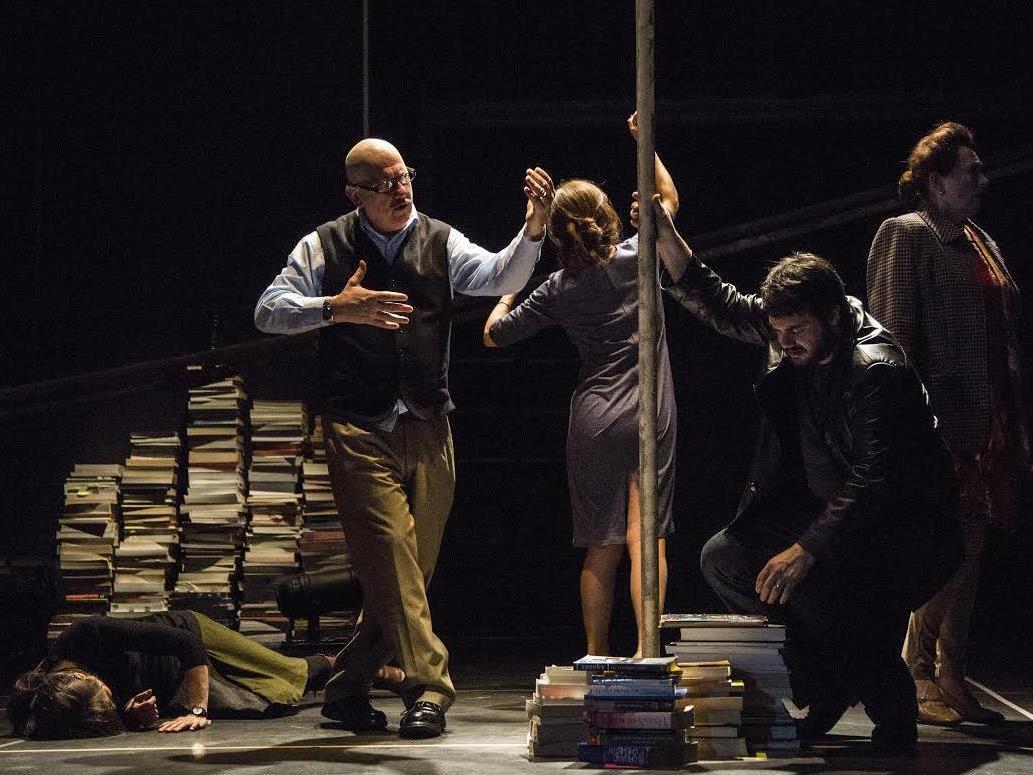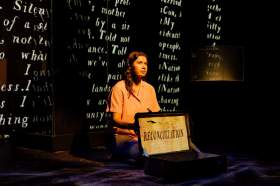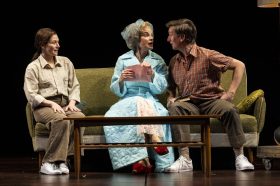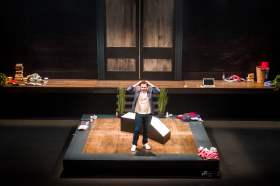Kate Hosking, PJ Williams, Zsuzsi Soboslay, Peter Cook and Geraldine Turner in The Chain Bridge; Photo by Lorna Sim.
The opening scene is a juxtaposition of two worlds; the old and the new; the young and the old. Amidst the pouring rain, a boy tests his mother’s patience as he hollers Hungarian songs, remnants of his mother’s past that she has brought with her to suburban Australia. ‘Sing something in English,’ she reprimands to her son. ‘The one about the sheep’. And so, with an air of despondency, the boy, played by an adult Peter Cook, changes his tune to the shearing song. ‘Click, click, click’.
Through clever production design and dexterous performances by all the actors, The Chain Bridge oscillates between war torn Budapest, ravaged first by the Nazis then by the Soviets during communist occupation, and quaint, comfortable Melbourne. Imre is hosting a dinner party for his mother and her two friends, also refugees from Budapest. They are coming together to celebrate the publication of Imre’s book, a novel eight years in the making. Sarah, Imre’s wife, insists that Imre interrogate his mum about the truth behind anecdotes in the book. Certain dates and details in his mother’s tales are not corroborated by records uncovered during Imre’s fact-finding missions to Hungary. The dinner party soon becomes a quest to reveal the truth behind the stories that Eva has passed on to her son.
Through the pages of Imre’s novel the audience relives glimpses of the world created by Eva. With consummate professionalism the actors transform themselves into a plethora of different characters, some more awkward than others. Whether it is veteran actor, Geraldine Turner, reliving Eva’s birth as a baby or Kate Hosking vacillating between an indignant Sarah and a desperate mother, the breadth of portrayals is impressive. The interchanging roles adeptly exhibit the flexibility of the theatrical form and highlights why, in this instance, it works as a effective storytelling vehicle.
The play itself is a probe for the truth. Reality slips away from this fraught family of fugitives, each of them hiding secrets behind a shadow of themselves. The impetus for the pursuit of the facts comes from Sarah, an outsider to the Hungarian connection, whose frustration with the increasing obfuscation of the historical narrative results in her increasing aggression towards Eva, placing Imre firmly in the middle of a difficult divide. Initially on the outskirts, but increasingly intertwined in the drama are Katalin and Jozsef, a long-standing couple who seem content to dance their way through any marital woes. While the younger generation seem obsessed with conveying the correct story so that Imre can portray memory with empathy in his book, the older generation seem relaxed about how the story is told, providing that it is told.
As the night wears on the lines become increasingly blurred when it becomes apparent that what Imre believes to be his grandmother Deborah’s biography may not actually belong to her after all. The symbolic walls of books positioned around the stage then all come crashing down in a tumultuous rebuke to history as each of the characters reveal a part of themselves that they would have preferred to forget. Deftly directed by Caroline Stacey, a veteran of the arts and CEO of The Street theatre, each scene is a polished depiction of the complex, meandering narrative, which is itself a metaphor for the allusiveness of historical fact. The modern day scenes are rendered as realistically as possible by treating the audience to a sensory experience with the smells of fish soup wafting into the stalls. Vivid lighting and penetrating sound effects are used to bring to life the war-time scenes, with intense events such as rape, murder and torture startlingly re-enacted to brutal effect. The final work is a highly accomplished production supported by an overwhelmingly talented cast that engages audiences to consider their own role in how they represent the past.
The ultimate incarnation of The Chain Bridge is a testament to The Street theatre’s dedication to promoting local, original works. Receiving support firstly through the Hive Project then brought to life under the First Seen program, the production is a sophisticated effort, reflecting the dedication and professionalism of all those involved. Tom Davis, an academic in political science and consultant in international development, is firmly making his mark as an innovative playwright to keep an eye on. The themes in his work transcend the historical setting while demonstrating the relevance of looking into the past to make sense of the present. Davis’ dialogue is natural yet refined, profound yet effortless. He has managed to blend together two worlds with an incredible amount of detail, allowing as much of an insight into the life of a Jew in Hungary as that given into the struggle for an academic to achieve prominence. Tom Davis’ work in itself justifies continuing support for the development of new works by emerging playwrights.
The Chain Bridge has just finished its successful first season at The Street theatre in Canberra. Let’s hope that the momentum continues for the next season and the next.
Rating: 4.5 stars
The Chain Bridge
Performed by Geraldine Turner, Peter Cook, Kate Hosking, Zsuzsi Soboslay, PJ Williams
Written by Tom Davis
21 – 29 November 2015
The Street Theatre, Canberra





